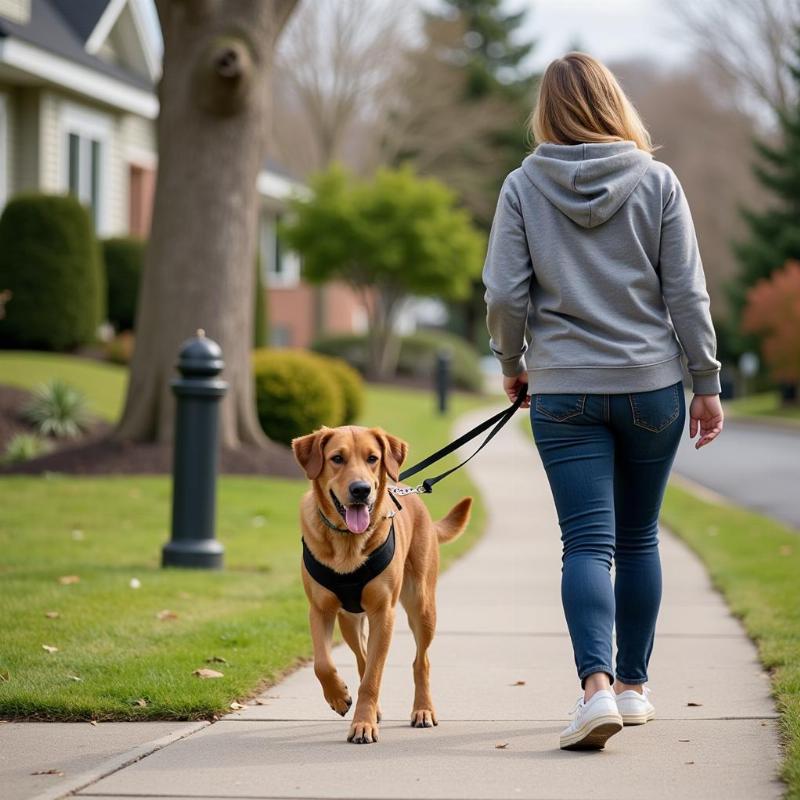Owning a dog is a rewarding experience, but what happens when your furry friend just doesn’t seem to listen? If your dog doesn’t listen to you, it can be frustrating and even concerning. This comprehensive guide will explore why your dog might be ignoring you and provide practical, actionable steps to improve communication and obedience, tailored specifically for dog owners in the US.
Understanding Why Your Dog Doesn’t Listen
There are several reasons why your dog might not be following your commands. It’s not necessarily defiance; often, it’s a communication breakdown. Perhaps your training methods aren’t clear, or there are distractions competing for your dog’s attention. Identifying the root cause is the first step towards a more harmonious relationship. Is it a lack of consistent training, a medical issue, or simply a breed-specific trait? Let’s delve into these possibilities.
Lack of Consistent Training
Inconsistent training is a common culprit. Just like children, dogs thrive on routine and clear expectations. Using different commands for the same action, or only occasionally enforcing rules, can confuse your dog and hinder their learning process. Think of it like speaking a different language every other day; your dog simply won’t understand what you want.
Medical Reasons for Non-Compliance
Sometimes, underlying medical conditions can contribute to a dog’s apparent disobedience. Hearing loss, vision problems, or even pain can make it difficult for your dog to understand and respond to commands. If your dog’s behavior changes suddenly, a visit to your local veterinarian is crucial to rule out any medical concerns.
Breed-Specific Traits and Temperament
Certain breeds are naturally more independent or prone to distraction. Understanding your dog’s breed-specific traits can offer valuable insights into their behavior and help you tailor your training approach accordingly. For example, a Husky might have a stronger instinct to roam and explore, making recall training more challenging. Consult the American Kennel Club (AKC) resources for breed-specific information.
Effective Training Techniques for American Dog Owners
Training your dog requires patience, consistency, and positive reinforcement. Here are some techniques recommended by American dog trainers:
- Positive Reinforcement: Reward desired behaviors with treats, praise, or toys. This encourages your dog to repeat those behaviors.
- Clear and Concise Commands: Use short, clear commands and avoid confusing your dog with multiple cues.
- Consistency: Maintain consistency in your training, ensuring everyone in the household uses the same commands and rules.
- Start Early: Begin training your puppy as early as possible to establish good habits.
- Seek Professional Help: If you’re struggling, consider enlisting the help of a certified professional dog trainer in your area.
Utilizing American Dog Training Resources
The US offers a wealth of resources for dog owners seeking training support. The AKC provides valuable information on training, breed standards, and responsible dog ownership. Many local dog training schools and clubs offer group classes and private lessons.
Addressing Specific Behavioral Issues
Is your dog jumping on guests? Ignoring your recall command? Addressing specific behavioral issues requires targeted training techniques. Let’s explore some common problems and solutions:
- Jumping: Teach your dog an alternative behavior, such as sitting, when greeting people.
- Recall: Practice recall training in a safe, enclosed area using positive reinforcement. Gradually increase the distance and distractions.
- Pulling on the Leash: Use a front-clip harness or head halter to discourage pulling and teach loose-leash walking.
 Addressing Specific Behavioral Issues in Dogs
Addressing Specific Behavioral Issues in Dogs
Creating a Positive Training Environment
A positive training environment is essential for success. Minimize distractions, create a safe space for your dog to learn, and keep training sessions short and engaging. Remember, a happy dog is a more receptive learner.
Conclusion
Addressing the issue of “my dog doesn’t listen to me” requires understanding, patience, and consistent effort. By identifying the root cause, implementing effective training techniques, and creating a positive learning environment, you can build a stronger bond with your dog and enjoy a more harmonious relationship. Remember to utilize the numerous resources available to dog owners in the US, such as the AKC and local training centers, to support your journey.
FAQ
- Why does my dog only listen to me sometimes? Inconsistency in training and environmental distractions can contribute to intermittent obedience.
- How can I get my dog to listen off-leash? Start with solid on-leash training and gradually introduce off-leash practice in a safe, enclosed area.
- Is it too late to train an older dog? It’s never too late to train a dog, regardless of age.
- What are some common mistakes dog owners make in training? Inconsistent commands, lack of positive reinforcement, and harsh punishment are common mistakes.
- Where can I find a certified dog trainer near me? The AKC website and local pet stores can often provide referrals to certified trainers.
- How do I stop my dog from barking excessively? Identify the trigger for the barking and address it with training techniques like desensitization and counter-conditioning.
- What should I do if my dog is aggressive towards other dogs? Consult a professional dog trainer or behaviorist experienced in dealing with aggression.
Related Articles
- why doesn’t my dog listen to me
- death of a pet dog poem
- poem for when a dog dies
- where can i buy rejensa for dogs
Beautdogs.us is your premier online resource for comprehensive dog care information, breed-specific guidance, and access to a wide array of products tailored to the needs of dog owners across America. Whether you’re a seasoned dog owner or just starting your journey, Beautdogs.us provides expert advice on training, nutrition, and overall well-being. From understanding your dog’s unique breed characteristics to finding the perfect products to enhance their quality of life, we’re here to help. Contact us today for all your dog-related inquiries: Email: [email protected], Phone: +1 501-555-7529. Visit Beautdogs.us for more information.